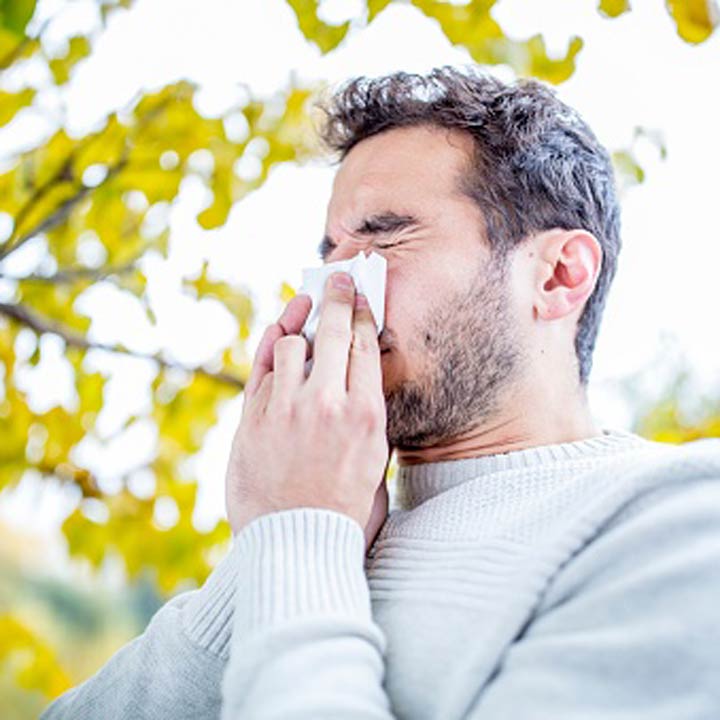 No one likes dealing with nagging symptoms of a runny nose, congestion, sneezing or coughing, which are common when you have rhinitis.
No one likes dealing with nagging symptoms of a runny nose, congestion, sneezing or coughing, which are common when you have rhinitis.
At The Ohio State University Wexner Medical Center, we want you to know you don’t have to live with these symptoms that impact your sleep, mood and overall quality of life. Our sinus care specialists (rhinologists) have a variety of treatment options to help you no matter what type of rhinitis you’re experiencing.
Not only is the Department of Otolaryngology – Head and Neck Surgery ranked as one of the best ear, nose and throat (ENT) programs in the country by U.S. News & World Report, but we’re also a regional and national referral center for sinus treatment. If asthma, allergies or other ENT conditions are contributing to your rhinitis, we can also collaborate with experts in other areas of our nationally recognized ENT program.
What is rhinitis?
Rhinitis occurs when areas of the nose become filled with fluid, causing nasal tissue to become inflamed or swollen. The cause of it depends on what type of rhinitis you have.
Types of rhinitis include:
- Acute rhinitis – a viral illness
- Allergic rhinitis – also known as hay fever
- Nonallergic rhinitis (vasomotor rhinitis) – typically has no identifiable cause
Nonallergic rhinitis is similar to hay fever except none of the usual signs of an allergic reaction are present. We’ll typically give this diagnosis after we’ve used skin and blood tests to rule out allergic reactions.
Also, symptoms like scratchy, watery eyes and an itchy throat or nose — hallmark signs of hay fever — don’t generally accompany nonallergic rhinitis.
What causes nonallergic rhinitis?
With nonallergic rhinitis, we’re generally not able to identify a cause. We’ve simply ruled out allergic causes or viruses.
However, we do know certain triggers in the environment can make the blood vessels in your nose swell, which leads to congestion, increased mucus, coughing or sneezing.
Some possible triggers of nonallergic rhinitis include:
- Smoke
- Foods, especially spicy
- Perfumes
- Paint
- Stress
- Weather changes
- Hormone changes, such as puberty, pregnancy or birth control pills
- Certain medications like beta blockers and blood pressure medication
- Overuse of nasal sprays
- Illegal drug use, especially cocaine
Nonallergic rhinitis symptoms
Symptoms of rhinitis mimic those of other sinus and nasal disorders. These symptoms include:
- Runny nose
- Congestion
- Coughing
- Sneezing
- Mucus in throat from postnasal drip
Nonallergic rhinitis is different from its allergic counterpart since it doesn’t generally cause watery eyes and itchy throat and nose like allergies do.
Rhinitis Treatments
Most people with nonallergic rhinitis can manage their symptoms at home. Actions such as running a humidifier and rinsing out nasal passages regularly can help alleviate symptoms.
If you know your rhinitis is triggered by a certain perfume or smoke, it’s best to avoid exposure to that smell whenever possible to prevent symptoms from occurring in the first place.
We’re able to prescribe some medications to reduce inflammation if your symptoms persist. These treatments include:
- Decongestants
- Antihistamines
- Corticosteroid nasal spray
- Anticholinergic nasal sprays
It’s important to remember that if rhinitis is left untreated, it can lead to other conditions, such as nasal polyps, rhinosinusitis (sinus infections) or ear infections, so it’s always a good idea to mention bothersome symptoms to your doctor.
How long does rhinitis last?
Nonallergic rhinitis generally clears up within a few days; however, if exposure to the triggers continues, rhinitis could become more chronic or last longer.
What’s the difference between rhinitis and rhinosinusitis?
Though both cause roughly the same symptoms, these two similar-sounding conditions are different.
Differences include:
- Rhinitis happens because an environmental allergen irritates the nose and rhinosinusitis happens when the sinuses become inflamed due to a virus or sinus blockage (congestion, nasal polyp, deviated septum).
- Rhinitis mainly affects the nasal passages, whereas rhinosinusitis happens mainly in the sinuses.
- Symptoms of rhinitis begin shortly after exposure to a trigger or an allergen, and rhinosinusitis takes time to develop, whether from a virus or continuous congestion.
Additional Information
How would you like to schedule?
Don’t have MyChart? Create an account
